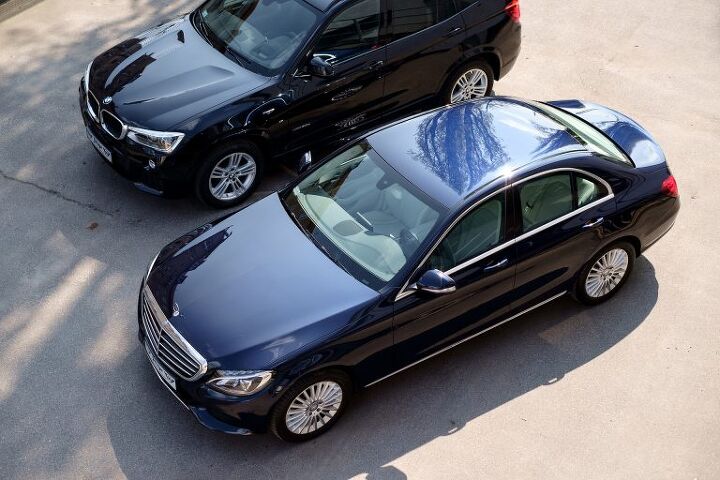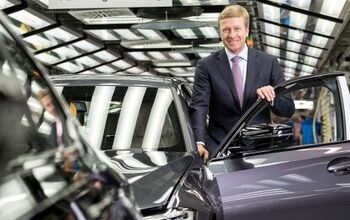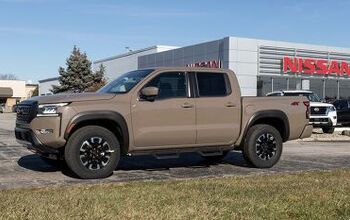BMW and Mercedes-Benz: The Next Automakers to Buddy Up?

Cooperation is commonplace among automakers. Chrysler has worked with, or been purchased by, just about everyone at this point, but it’s far from the only manufacturer to get chummy with a rival company. Ford and Volkswagen are busy discussing their future together and Toyota tapped other brands to help it co-develop performance models like the 86 and Supra.
Despite their longstanding and occasionally bitter rivalry, Mercedes-Benz and BMW could be the next duo to cozy up to one another. According to German outlet Handelsblatt, BMW chairman Harald Krüger and Daimler management board member Ola Källenius are currently examining the possibility of an automotive alliance.
The primary goal would be the joint absorption of billions in development costs and the establishment of a common industry standard for autonomous vehicles. However, self-driving tech appears to be a secondary issue. With the margins (and demand) for small cars looking slimmer than ever, the pair are considering developing next-generation compact cars together — most likely starting with the 1 Series and A-Class. Insiders informed on the matter believe shared development and manufacturing of the models could save the companies billions.
The prospective fruits of such an endeavor would need years to ripen. Daimler just released its new A-Class a few months ago, while the 1 Series saw a revamp only a year earlier in China. Neither car is due for an update for some time, and any new compact architecture wouldn’t come into play for at least a few more years. Handelsblatt claimed 2025 at the earliest.
Both automakers also seem concerned with the cost of developing autonomous systems capable of keeping up with the big boys in Silicon Valley. While other automakers have made meaningful headway, GM is not quite the industry leader it once seemed, and the rest of the field has settled in a gray area or simply abandoned the race. It’s no longer obvious who exactly is leading the charge into autonomy. Still, tech companies have soldiered on in the hopes that they can one day provide inexpensive alternatives to car ownership. Part of the preliminary talks between BMW and Mercedes-Benz involve how to avoid financial disaster if and when that day comes.
“Those who are the first to dominate autonomous driving, who are the first to offer a functioning autonomous taxi fleet, occupy a huge market,” said Dietmar Voggenreiter of the consulting firm Horváth & Partners. “In the US, Waymo and Uber are hard to beat as platform operators,” he continued, “but in Europe, roles are not yet dispersed.”
While the pair already cooperate loosely via Daimler’s Car2Go and BMW’s DriveNow, both short-term rental programs, joint development and production would be new ground for the pair.
Currently, both find themselves part of an ongoing European investigation into whether the duo were part of a larger automotive cartel that worked together to manipulate the prices of automotive parts. That, plus other unsavory accusations (some of which pitted BMW and Mercedes against each other), could make the companies choose to keep their distance.

A staunch consumer advocate tracking industry trends and regulation. Before joining TTAC, Matt spent a decade working for marketing and research firms based in NYC. Clients included several of the world’s largest automakers, global tire brands, and aftermarket part suppliers. Dissatisfied with the corporate world and resentful of having to wear suits everyday, he pivoted to writing about cars. Since then, that man has become an ardent supporter of the right-to-repair movement, been interviewed on the auto industry by national radio broadcasts, driven more rental cars than anyone ever should, participated in amateur rallying events, and received the requisite minimum training as sanctioned by the SCCA. Handy with a wrench, Matt grew up surrounded by Detroit auto workers and managed to get a pizza delivery job before he was legally eligible. He later found himself driving box trucks through Manhattan, guaranteeing future sympathy for actual truckers. He continues to conduct research pertaining to the automotive sector as an independent contractor and has since moved back to his native Michigan, closer to where the cars are born. A contrarian, Matt claims to prefer understeer — stating that front and all-wheel drive vehicles cater best to his driving style.
More by Matt Posky
Latest Car Reviews
Read moreLatest Product Reviews
Read moreRecent Comments
- Mike Beranek No interior pictures usually means that the interior looks like death warmed over.
- Kwik_Shift_Pro4X Oof. (again)Not looking good.
- DungBeetle62 This happened after a run of black cars that lasted Nov 1999 - Jan 2022.And while I like black cars, I had to vote with my dollars so we'll (hopefully) still have a choice
- Arthur Dailey 'Ere it's a nice little runner.Actually anyone with my log-in/sign-in name and picture absolutely should not be commenting on this article.
- Arthur Dailey Is the original Legend absolute peak Honda?


































Comments
Join the conversation
BMW are using a FWD MINI platform for the 1 series, Merc are using a Renault compact hatchback for the A class. Pairing MINI and Smart (the forFour shares a platform with a sub-compact Renault) might be a 'smart' idea too....
Don’t Greeley own some of Mercedes now? If so where would this leave Volvo? Or would it be a threesome?